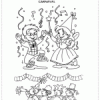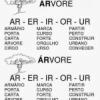
Portuguese activity, suitable for students in the ninth year of elementary school, explores the possessive pronouns. Are we going to study the pronouns that express the idea of possession? To do this, answer the questions based on the text January 7th - Reader's Day!
You can download this Portuguese language activity in an editable Word template, ready to print in PDF and also the completed activity.
Download this Portuguese exercise at:
SCHOOL: DATE:
PROF: CLASS:
NAME:
Read:
It's a day to congratulate you, who proved to be a good reader of my stories. Today is yours, mine and the day of everyone who loves to read! Ziraldo always says that reading is as necessary as breathing, eating, sleeping and drinking water. Do you go a day without eating? No? So you shouldn't go a day without reading either! We eat to feed the body and we read to feed our soul and our creativity to grow. Those who read live much better, and to exercise any kind of profession we have to read a lot to be more competent professionals. In celebration, give yourself a big kiss (it can be in the mirror) and another one on your favorite book and celebrate today by reading some really cool stories!
Available in: .
Question 1 - Identify the passage in which the highlighted pronoun indicates possession:
( ) “It's a day to congratulate you, who proved to be a good reader of my stories.”
( ) “Who reads lives much better, and to exercise any kind of profession […]"
( ) “[…] we we have to read a lot to be more competent professionals.”
Question 2 - In the excerpt mentioned above, the possessive pronoun performs the syntactic function of determining a noun. So it is:
( ) a bet.
( ) an adnominal adjunct.
( ) a nominal complement.
Question 3 - Highlight the possessive pronouns that make up this passage of the text:
"Today is yours, mine and the day of everyone who loves to read!"
Question 4 – In the passage above, the possessive pronouns have in common:
( ) the gender.
( ) the number.
( ) gender and number.
Question 5 - In the segment “We eat to feed the body and we read to feed our soul […]”, the possessive pronoun refers to:
( ) to the 1st person plural.
( ) to the 2nd person plural.
( ) to the 3rd person plural.
Per Denyse Lage Fonseca Graduated in Languages and specialist in distance education.
At answers are in the link above the header.
 report this ad
report this ad

